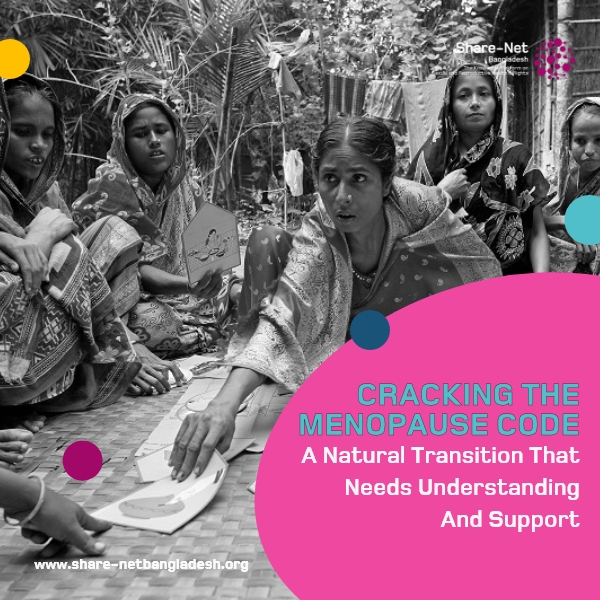Cracking the Menopause Code: A Natural Transition That Needs Understanding And Support
Throughout our life, we go through many physical and psychological phases. From curious childhood to jolly adolescent, from rebel teen to calm thirties, we have seen our friends and cousins go through a lot of changes. But have we ever wondered why our sweet and caring mothers become cranky or nagging, especially after their fifties? It’s because of ‘menopause’.
Menopause is a natural biological process marking the end of a woman’s menstrual cycles, usually occurring in their late 40s or 50s. Despite its inevitability, menopause remains a largely stigmatised and misunderstood subject, especially from the perspective of men. It’s crucial to understand menopause not just for the women going through it but for everyone in their lives. This understanding is deeply intertwined with Sexual and Reproductive Health and Rights (SRHR) and plays a significant role in achieving Sustainable Development Goals (SDGs) related to health and gender equality.
Symptoms of menopause vary widely but often include hot flashes, night sweats, mood swings, and sleep disturbances. These symptoms can be debilitating, affecting daily life and work. In many cultures, including ours, these symptoms are rarely discussed openly, leaving women to suffer in silence. This lack of awareness and empathy is particularly problematic in patriarchal societies where women’s health issues are often trivialised.
For instance, hot flashes, which cause sudden feelings of heat and sweating, can be extremely uncomfortable. Imagine a working mother having multiple hot flashes throughout the day, even during sleep. Inefficient ventilation in kitchens makes cooking or working there even more exhausting for these women. Unfortunately, these struggles are often overlooked by family members who are unaware of menopause. This ignorance leads to a lack of support at home, further complicating the situation for menopausal women.
Mood swings are another common symptom, often leading to misunderstandings and criticism. The hormonal fluctuations during menopause can cause emotional instability, leading to outbursts and irritability. However, instead of showing understanding and compassion, family members, particularly men, may label these emotional changes as “cranky” or “mad” behavior. This misogynistic attitude exacerbates the emotional distress of women, making them feel isolated and unsupported during a critical phase of their life.
Moreover, the societal stigma surrounding menopause can make women feel insecure and ashamed. Many women hesitate to discuss their menopausal symptoms even with their husbands, fearing they will be seen as old and less attractive. This insecurity can strain relationships and lead to a lack of intimacy and understanding between partners.
Understanding menopause is not only about recognising the physical symptoms but also about addressing the psychological and social impacts. It is essential for men to educate themselves about menopause to support the women in their lives better. Fathers, brothers, and husbands can play a pivotal role by showing empathy and providing emotional and practical support. This understanding can help break down the stigma associated with menopause and promote a more inclusive and supportive environment for women.
In the context of SRHR, raising awareness about menopause is crucial. It aligns with the goals of ensuring healthy lives and promoting well-being for all at all ages (SDG 3), as well as achieving gender equality and empowering all women and girls (SDG 5). By fostering a better understanding of menopause, we can contribute to a society that respects and supports women’s health and rights throughout their lives.
Understanding menopause is not easy, but we can show our care for our mothers and aunts. Fathers could play a vital role in supporting and understanding. By acknowledging and addressing the challenges of menopause, we can create a more empathetic and informed society, ensuring that women do not have to endure this transition alone and unrecognised.
Source: The Daily Star


